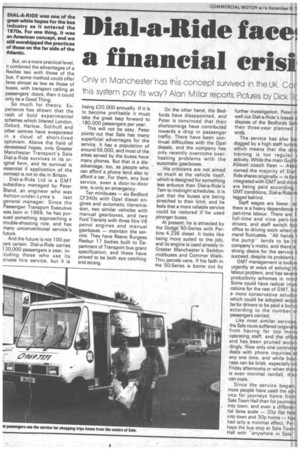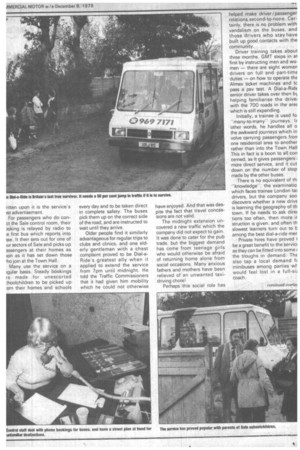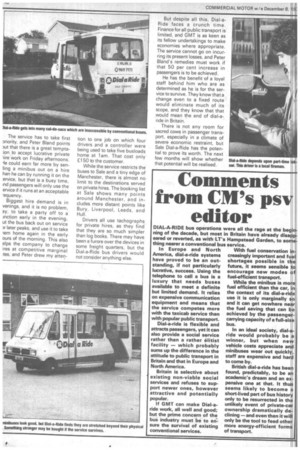Dial-a-Ride facet a financial erisi
Page 48

Page 49

Page 50

If you've noticed an error in this article please click here to report it so we can fix it.
Only in Manchester has this concept survived in the UK Car this system pay its way? Alan Millar repoils. Pic-ures by Dick Rc
DIAL-A-RIDE was one of the great white hopes for the bus industry as it entered the 1970s. For one thing, it was an American concept, and we still worshipped the practices of those on the far side of the Atlantic.
But, on a more practical level, it combined the advantages of a flexible taxi with those of the bus. If some method could offer fares almost as low as those of buses, with transport calling at passengers' doors, then it could only be a Good Thing.
So much for theory. Experience has shown that the rash of bold experimental schemes which littered London, .Oxford, Harlow, Solihull and other centres have evaporated in a cloud of short-lived optimism. Above the field of devastated hopes, only Greater Manchester Transport's Sale Dial-a-Ride survives in its original form, and its survival is essential if application of the concept is not to die in Britain.
Dial-a-Ride Ltd is a GMT subsidiary managed by Peter Bland, an engineer who was Ashton-under-Lyme's last general manager. Since the Passengwr Transport Executive was born in 1969, he has pursued .something approaching a trouble-shooting role, and has many unconventional service's future.
And the future is not 100 per Dent certain. Dial-a-Ride carries 120,000 passengers a year, in:luding those who use its )rivate hire service, but it is losing £20,000 annually. If it is to become profitable it must take the great leap forward to 180,000 passengers per year.
This will not be easy. Peter points out that Sale has many superficial advantages for the service. It has a population of around 56,000, and most of the areas served by the buses have many phones. But that is a disadvantage, too, as people who can afford a phone tend also to afford a car. For them, any bus service, even a door-to-door one, is only an emergency.
Ten minibuses — six Bedford CF340s with Opel diesel engines and automatic transmission, two similar vehicles with manual gearboxes, and two Ford Transits with three litre V6 petrol engines and manual gearboxes — maintain the service. They have Reeve Burgess Reebur 17 bodies built to Department of Transport bus grant specification, and these have proved to be both eye catching and strong. On the other hand, the Bedfords have disappointed, and Peter is convinced that their shortcomings have contributed towards a drop in passenger traffic. There have been continual difficulties with the Opel diesels, and the company has only recently overcome overheating problems with the !automatic gearboxes.
His criticisms are not aimed so much at the vehicle itself, which is designed for something less arduous than Dial-a-Ride's 7am to midnight schedules. It is just that the buses are being stretched to their limit, and he feels that a more reliable service could be restored if he used ,stronger buses.
At present, he is attracted by the Dodge 50-Series with Perkins 4.236 diesel. It looks like being more suited to the job, and its engine is used already in Greater Manchester's Seddon midibuses and Commer WalkThru parcels vans. If his faith in the 50-Series is borne out by further investigation, Peter m well cut Dial-a-Ride's losses a dispose of the Bedfords befr their three-year planned I ends.
The service has also be, dogged by a high staff turnov which means that the driv training is too regular activity. While the main Godfri Abbott coach fleet — Abbc owned the majority of DialRide shares originally — is beir integrated with GMT and drive are being paid according GMT conditions, Dial-a-Rideh lagged behind.
Staff wages are lower, an there is a heavy dependence o part-time labour. There are 1 full-time and nine part-tim drivers, and staff switch fror office to driving work when dr mand fluctuates. -All hands t the pumptends to be th company's motto, and there is strong desire for the service t, succeed, despite its problems.
GMT management is lookini urgently at ways of solving thi labour problem, and has severe productivity schemes in mind Some could have radical imphi cations for the rest of GMT, bu a more conservative solutior which could be adopted woulc be for drivers to be paid a bonus according to the number ol passengers carried.
Like most similar services, the Sale route suffered originally from having far too many operating staff, and the office end has been pruned accordingly. Now only one controller deals with phone inquiries at any one time, and while business can be brisk, especially on Friday afternoons or when there is even minimal rainfall, they can cope.
Since the service began, more people have used the service for journeys home from Sale Town Hall than for journeys into town, and even a differential fares scale — 20p flat fare into town and 30p home — has had only a minimal effect. Perhaps the bus stop at Sale Town Hall with "anywhere in Sale ritten upon it is the service's st advertisement.
For passengers who do conct the Sale control room, their )oking is relayed by radio to le first bus which reports into ase. It then sets out for one of iur sectors of Sale and picks up assengers at their homes as on as it has set down those ,ho join at the Town Hall.
Many use the service on a gular basis. Steady bookings re made for unescorted :hoolchildren to be picked up
.om their homes and schools
every day and to be taken direct in complete safety. The buses pick them up on the correct side of the road, and are instructed to wait until they arrive.
Older people find it similarly advantageous for regular trips to clubs and clinics, and one elderly gentleman with a chest complaint proved to be Dial-aRide's greatest ally when it applied to extend the service from 7pm until midnight. He told the Traffic Commissioners that it had given him mobility which he could not otherwise have enjoyed. And that was despite the fact that travel concessions are not valid.
The midnight extension uncovered a new traffic which the company did not expect to gain. It was done to cater for the pub trade, but the biggest demand has come from teenage girls who would otherwise be afraid of returning home alone from social occasions. Many anxious fathers and mothers have been relieved of an unwanted taxidriving chore!
Perhaps this social role has helped make driver/passenger relations second-to-none. Certainly, there is no problem with vandalism on the buses, and those drivers who stay have built up good contacts with the community.
Driver training takes about three months. GMT steps in at first by instructing men and women — there are eight women drivers on full and part-time duties — on how to operate the Almex ticket machines and tc pass a psv test. A Dial-a-Ride senior driver takes over then b) helping familiarise the drivel with the 700 roads in the are • which is still expanding.
Initially, a trainee is used fo "many-to-many" journeys. Ir 'other words, he handles all o the awkward journeys which in volve carrying passengers frorr one residential area to another rather than into the Town Hall This in fact is a boon to all con cerned, as it gives passengers ; more direct service, and it cut down on the number of stop made by the other buses.
There is no equivalent of th "knowledge", the examinatio which faces trainee London ta) drivers, but the company soo discovers whether a new drive is learning the geography of th town. If he needs to ask dire( tions too often, then more ir struction is given, and often th slowest learners turn out to among the best dial-a-ride rner Private hires have proved I be a great benefit to the servic( as they can be fitted into some ( the troughs in demand. The also tap a local demand fc
'minibuses among parties wiwould feel lost in a full-si; coach. The service has to take first priority, and Peter Bland points Jut that there is a great temptaion to accept lucrative private tire work on Friday afternoons. -le could earn far more by seniing a minibus out on a hire han he can by running it on the ervice, but that is a busy time, ,nd passengers will only use the ervice if it runs at an acceptable -equency.
Biggest hire demand is in venings, and it is no problem, 3y, to take a party off to a inction early in the evening, ut the bus back out on service Jr later peaks, and use it to take lem home again in the early ours of the morning. This also elps the company to charge ires at competitive marginal les, and Peter drew my atten
tion to one job on which four drivers and a controller were being used to take five busloads home at 1am. That cost only El 50 to the customer.
While the service restricts the buses to Sale and a tiny edge of Manchester, there is almost no limit to the destinations served on private hires. The booking list at Sale shows many points around Manchester, and includes more distant points like Bury, Liverpool, Leeds, and Hull.
Drivers all use tachographs. for private hires, as they find that they are so much simpler than log books. There may have been a furore over the devices in some freight quarters, but the Dial-a-Ride bus drivers would not consider anything else.
But despite all this, Dial-aRide faces a crunch time. Finance for all public transport is limited, and GMT is as keen as its fellow undertakings to make economies where appropriate. The service cannot go on incurring its present losses, and Peter Bland's remedies must work if that 50 per cent increase in passengers is to be achieved.
He has the benefit of a loyal staff behind him who are as determined as he is for the service to survive. They know that a change even to a fixed route would eliminate much of its scope, and they know that that .would mean the end of dial-aride in Britain.
There is not any room for sacred cows in passenger transport, especially in a climate of severe economic restraint, but Sale Dial-a-Ride has the potential to prove its worth. The next few months will show whether that potential will be realised.
























































































































































